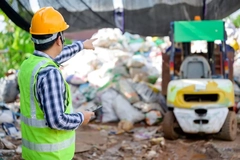EU must strengthen policy and investment after global plastic treaty setback, say experts

The failure of the INC-5.2 talks to establish a UN Global Plastic Treaty has sparked concern among the EU’s plastic and plastic recycling industries. Plastics Europe and Plastics Recyclers Europe (PRE) argue the setback highlights the need for the EU to maintain policy practices, investment, and cooperation.
“We hear and share society’s concerns and are disappointed by the inability to agree on a global, legally binding agreement in Geneva. Plastic pollution is a global, not just regional, challenge, and we urge all UN member states to resume multilateral efforts as soon as possible,” Dr. Katharina Schlegel Thummer, circularity director at Plastics Europe, tells Packaging Insights.
“In Europe, we will continue working with EU policymakers to help deliver our Plastics Transition roadmap. While the roadmap establishes a credible path to circularity and net zero, more intense and effective cooperation between policymakers, manufacturers, and our value chain is still needed to achieve its objectives, particularly in light of the EU’s ongoing competitiveness challenge.”
Meanwhile, a spokesperson for the PRE tells us the EU has grown to be the frontrunner in the transition to a circular economy, made “massive” investments, and developed innovations that have advanced plastics circularity in the region.
“Yet, today, the EU is facing a crisis which threatens its environmental goals and years of growing recycling capacities on the continent.”
“PRE calls for policymakers to urgently put forward solutions that drive demand for locally produced recyclates, alleviate economic pressure on recyclers, reduce paperwork to obtain and renew permits, and encourage targeted investments in the industry.”
Action in light of the INC-5.2 outcome
Schlegel Thummer applauds the decision and political will to continue the UN Global Plastic Treaty negotiations, build a global consensus, and enable policy frameworks. However, she argues that “the format, timeframe, and likely outcome of the next phase of negotiations are uncertain.”
Plastics Europe urges EU to maintain policy and investment momentum amid uncertainty.“This will inevitably delay the development of a global legally binding treaty on plastic pollution and many international efforts to end plastic pollution by 2040. However, the treaty negotiations have played a valuable role in highlighting many significant barriers and opportunities to creating a circular global plastics system.”
Plastics Europe urges UN member states to develop and implement national action plans in parallel to the ongoing negotiations.
“These should address plastic pollution, prioritizing circularity with demand incentives and increasing access to waste management for 2.7 billion people who currently lack it.”
The plans should also promote science-based and application-based approaches to non-essential plastics, with a focus on high-leakage plastic products. “Plastics Europe and its members will continue to act even in the absence of an agreement.”
PRE also supports continued work to achieve global measures that advance circular plastics. The spokesperson notes that the inability to reach an agreement to boost effective plastic waste management worldwide “is partially linked to varied levels of readiness among countries and the difficulties in shifting policy and industry practices.”
EU must do more to stay a leader
PRE explains that Europe’s plastic recycling industry is witnessing a strong market recession caused by several colliding factors. “Increased imports that often do not comply with the same environmental and safety standards have triggered market imbalances.”
“This, paired with economic pressures such as very high energy costs and legal uncertainties, has resulted in the lack of a level playing field, triggering a wave of recycling plant closures across Europe.”
Schlegel Thummer calls for mandatory, time-bound recycled content targets to stimulate demand, unlock private sector investment, and create strong incentives to reuse and recycle plastics rather than allow them to leak into the environment
“Well-designed EPR schemes will further ensure companies finance the end-of-life management of their products, securing long-term financing for collection, sorting, and recycling, while integrating the informal sector where needed.”
She also points to the importance of the expansion of waste management infrastructure.
“Particularly for the 2.7 billion people who currently lack access. This requires global guidance, local action plans, and financing mechanisms.”
Lastly, she demands an “effective reporting framework” to ensure accountability, transparency, and a just transition to a circular economy.
PRE calls for policy action to drive demand for EU-produced plastic recyclate.“Together, these frameworks make end-of-life plastics more valuable and enable systemic, globally scalable change. The greater the economic value of plastic waste, the stronger the incentive to reuse and recycle, and to stop plastic leaking into the environment,” she adds.
She argues that the delayed treaty negotiations do not affect our objectives in the EU, which she says “remains among the most advanced regions in the world regarding the transition to a circular plastics system.”
The PRE spokesperson adds that “measures must be paired with efforts to boost regional recycling practices, as well as the overall management of plastic waste at the local level.”
“It is essential to improve the traceability of recycled plastics that can boost the trust and reliability in the recycled plastic feedstock.”
Pairing strong policy practices with decisive action is the only way to address the current plastic waste challenges, according to the PRE. “It is imperative to boost regional capacities and demand, with an overarching goal of achieving a sustainable future for generations to come.”
Making recyclate a commodity
Plastics Europe calls for end-of-life plastic to become a circular feedstock and commodity with real value. Schlegel Thummer says this will ensure that plastic is no longer littered, landfilled, or incinerated, significantly contributing to ending plastic pollution.
“A global treaty on plastic pollution that is tailored to local contexts while focusing on waste management and establishing a circular plastics system is essential to this vision. Only by making this connection can waste serve as a future feedstock. Countries will also need enabling policy frameworks that create the necessary demand for, and supply of, circular plastics to ensure competition for end-of-life plastics as a feedstock.”
She outlines that, given the outcome in Geneva, Plastics Europe urges negotiators to focus on what unites nations, namely the need to build waste management capacity and a circular model.
“We need to ensure that ambition does not undermine a generational opportunity to kick-start real-world investment and progress toward ending plastic pollution globally. The reality is that companies require clarity on regulatory direction before committing billions to recycling systems and new technologies.”










